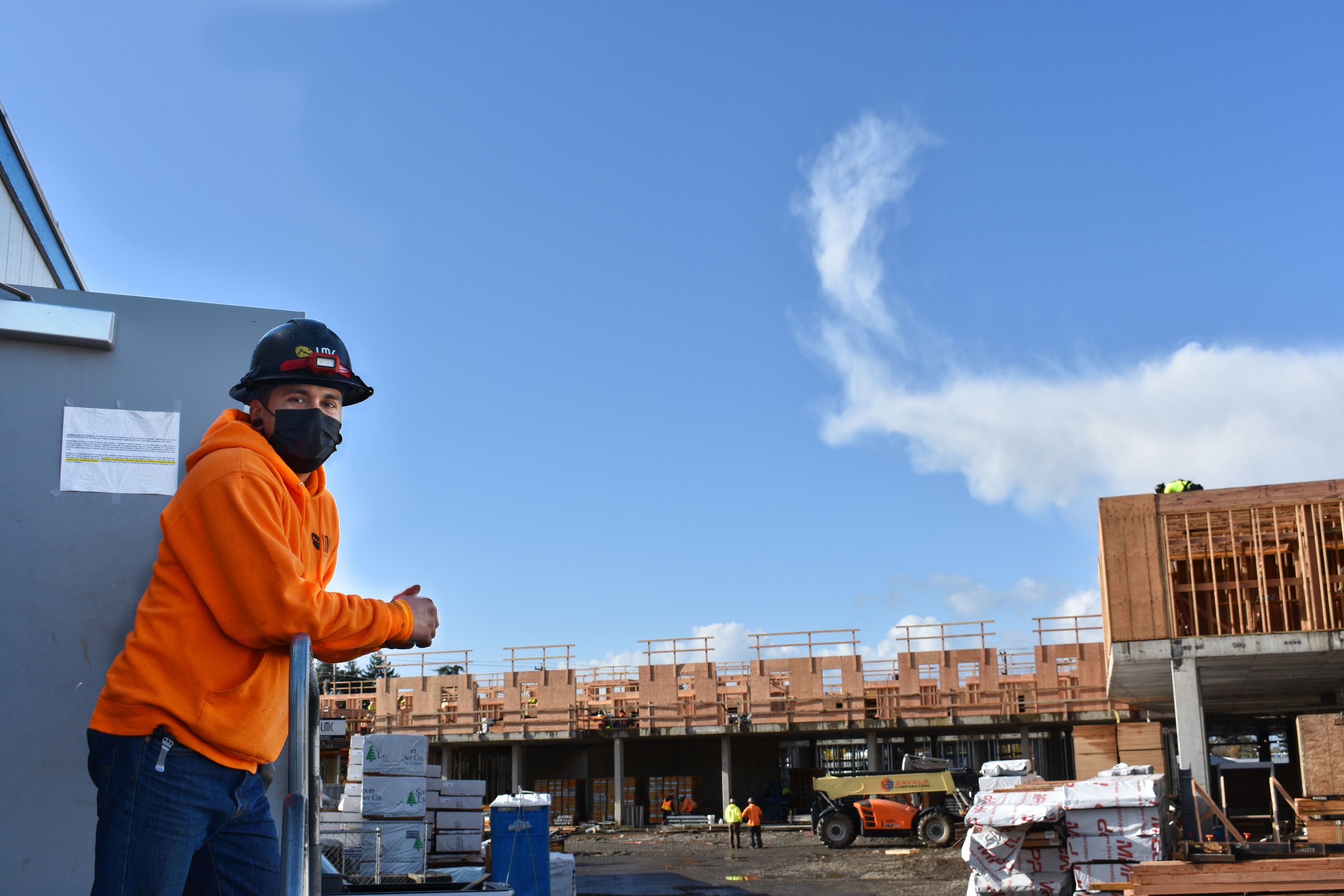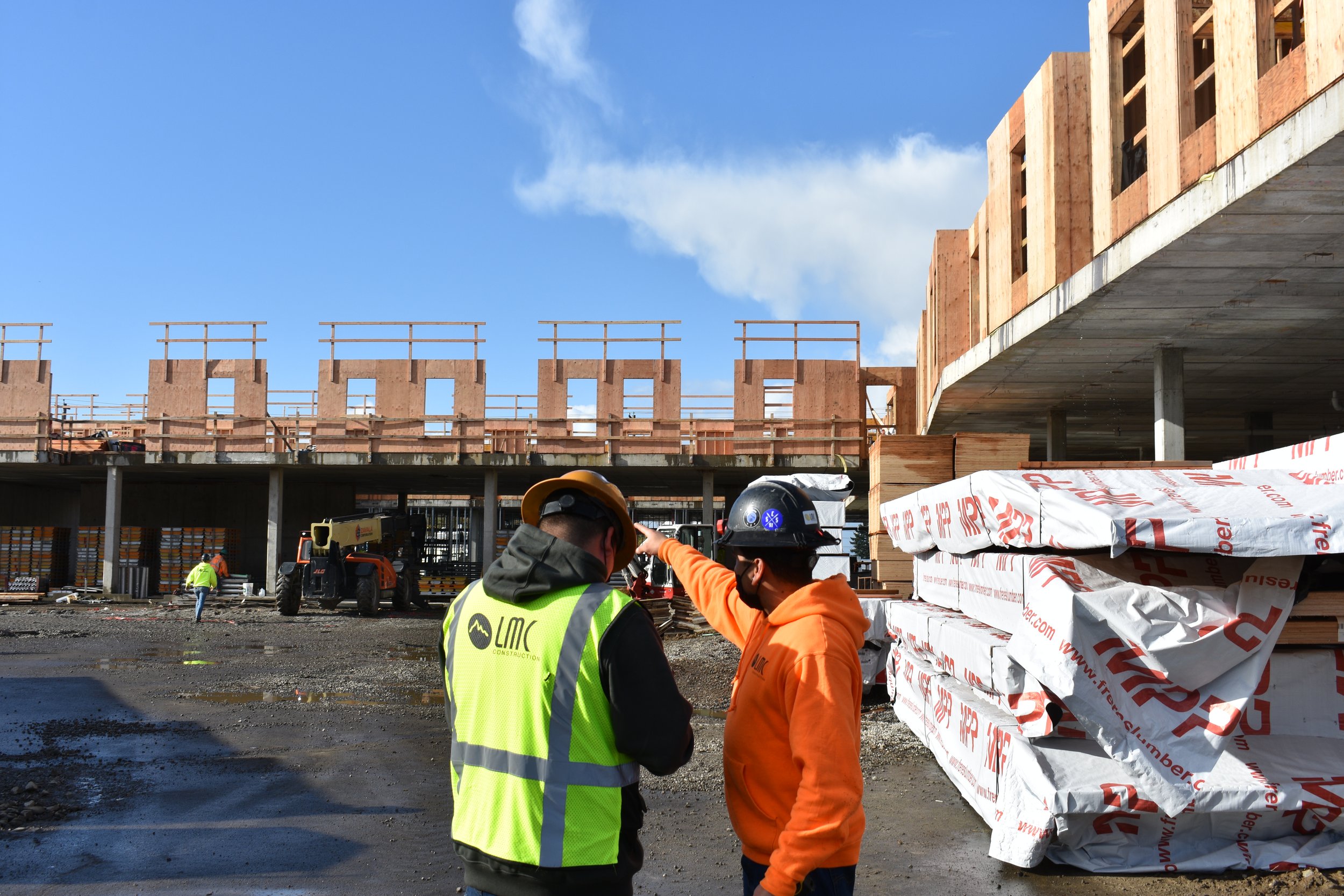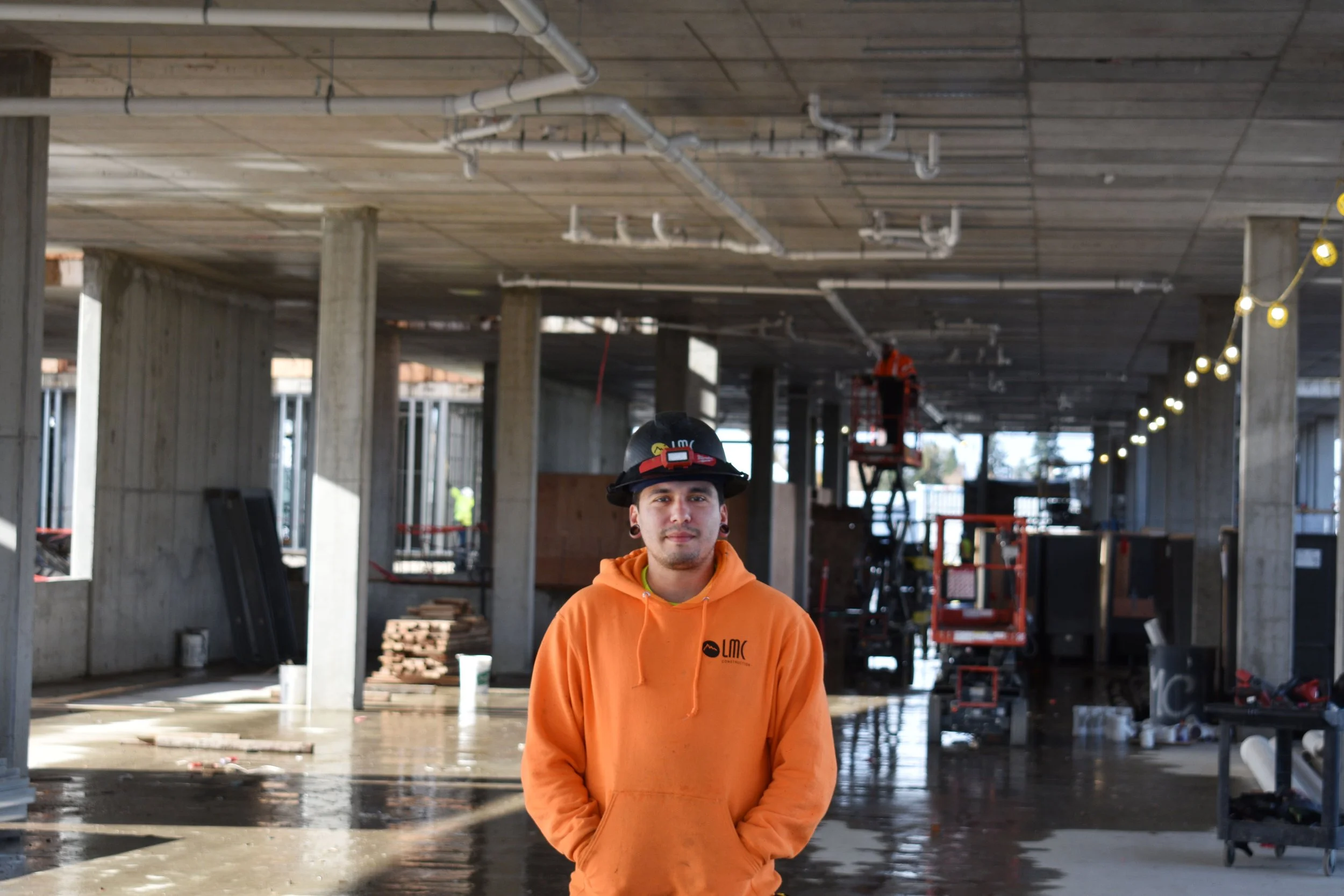Meet Saulo: Verde Foreman Intern Gaining Experience and Giving Back at Las Adelitas
“I work like a laborer, delegate like a foreman, and study like an intern,” says Saulo Quezada with a smile after a long day’s work. That’s how he describes LMC’s approach to developing his skills as a Foreman on the construction of Las Adelitas through a unique partnership between Verde and LMC.
Verde and Hacienda were early neighborhood partners in identifying the need to acquire and convert the Sugar Shack, a former strip club, into a community asset. Las Adelitas, which is under development by Hacienda with LMC as the general contractor, will include 142 units of affordable housing and is scheduled to be completed and welcome new residents in October 2022.
With the goals of continuing Verde’s participation and expanding the organization’s capacity to manage future projects, LMC and Verde agreed on a two-pronged approach: for Verde to assist LMC in the selection of a subcontractor to install the solar panel system and for Verde to hire a Foreman intern to be trained and mentored by LMC throughout the 18-month project construction schedule.
Now that the solar subcontractor, Neil Kelly/O’Neill Electric, has been selected, and Saulo’s been on the job for six months, those two paths are converging: Saulo has been assigned as the lead LMC contact for the solar panel array installation. “It’s a lot of responsibility. First I need to learn how the roof is constructed and then figure out how the array connects to it. I’ve been watching videos and studying the plans. I can go down rabbit holes real easy,” says Quezada.
A self-described former hoodlum from Santa Ana, CA, seven years ago Quezada, the son of Mexican immigrants, left behind a carefree lifestyle that consisted of working as a carpenter, taking college classes, surfing, skating, and boxing, as well as enjoying the close-knit network of family and friends in the largely Mexican-immigrant community. “I woke up from a dream one day where I saw my future, and I was disappointed. I hadn’t realized my full potential.” That same night, he bought the cheapest one-way ticket out. Never having visited Oregon before, he landed in Portland in September 2013 wearing shorts, a tank top, and no socks. “I didn’t even have a jacket. I had never experienced rain and dark nights like that before.”
Not knowing how long he’d stay, couch surfing, and relying on his savings, he slowly began piecing together odd jobs including bartending, sales, and the occasional construction gig. He made a commitment to stay when he moved into an apartment three months later. “I was either going to succeed or end up homeless,” he says. “No calling home for help or money.”
Curious by nature, Saulo found himself drawn to project management and teamwork. “I like to be in the mix,” he says, describing the process and sequence of events needed to turn an idea into a physical reality. This led to long-term employment with a local producer of custom wood coverings for high-end products. He could see the wood come in one door, and the finished product out the other, and enjoyed being part of every process in between.
In the meantime, Saulo had developed two new passions: cycling and social justice. His interest in cycling had started in Santa Ana as a cardio workout alternative to his boxing coach’s running assignments, but became a lifestyle when he started commuting and found a supportive community in Portland. Although familiar with low-income, Latinx, and immigrant communities, in Portland Quezada became more aware of other marginalized groups. He saw an opportunity to expand participation in cycling and began volunteering his time and skills with BikePOC, which assembles bikes and hosts rides to welcome people of color, women, and the LGBQT community into cycling.
By 2020, Saulo began thinking about how to incorporate these passions into his career plans. With a fresh resume and a solid track record, he applied to local cycling manufacturers as well as for two program management positions with Verde without success. A bit discouraged, it was then he received the call offering the Foreman internship. Verde had remembered his applications and thought this was the perfect fit.
“I was scared. It took me a month to think it over before accepting the position,” says Saulo. His main trepidation was the construction worker culture, where he had previously observed racist, sexist, and homophobic comments. “The work is hard enough, there’s no reason people should be subjected to that at the jobsite.” Quezada consulted with friends and decided his leadership could create space for more people, but he needed to establish clear boundaries.
Quezada says LMC’s Superintendent Bob Kantola set the standard from the very beginning: “Bob tells us it’s about the greater good.” Kantola, who has more than 40 years of construction experience, sits down with Saulo every week to go over the project plans and schedule, helping him to navigate the project management software, and to understand how the building’s elements fit together. “Bob’s built the environment, and Carlos is my main mentor, he helps me see, not just what’s happening today but also how it connects to three months from now.”
Saulo with Ernesto Fonseca, CEO of Hacienda CDC
The Las Adelitas story and Hacienda’s mission attracted Quezada to the job. “I wouldn’t have taken the position for just any construction project. It was Hacienda’s involvement and the community they serve that makes it matter. I want to see my people, Latinx, Africans, low-income, immigrants, LGBQT, etc. benefit from this work.” Quezada has described the project to his mother who is familiar with the Adelitas story and she tells him “Think of us, think of me.” Everyday he shows up to work with a smile because he sees the connection to his own past, knows he’s part of something bigger than himself, and is continuing to grow as a person. “I remind myself everyday: Hard Work. Dedication. Joy. Patience.”
Before arriving in Portland, Quezada thought he wasn’t meant to succeed. “I realize now the difference between success and failure is just not stopping. From cycling I learned about endurance and resilience. I need to keep pedaling, moving forward, and I’ll get there.” He is motivated by building opportunities for others, noting that children will see the mountains from the upper floors, as far as they can see will be views of something beautiful and the endless possibilities in the bigger world. “I can’t wait for this to be completed. I can see it now. We will have done something to elevate the next generation.”




